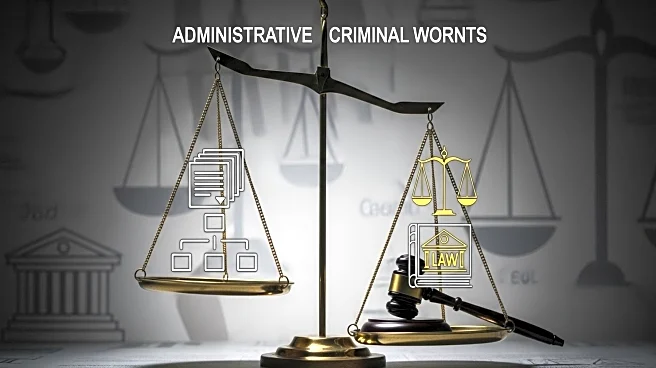What's Happening?
The U.S. Immigration and Customs Enforcement (ICE) utilizes two types of warrants in its operations: administrative and criminal. Administrative warrants, often used by ICE, are civil documents issued by the Department of Homeland Security and do not require judicial approval. These warrants allow ICE to arrest individuals in public spaces but do not permit entry into private homes or businesses without consent. In contrast, criminal warrants require probable cause and judicial approval, allowing law enforcement to search specific locations. The distinction between these warrants is crucial as it affects ICE's ability to conduct raids and arrests, particularly in private settings. The ongoing immigration enforcement efforts under President Trump's administration have led to increased public awareness and 'Know Your Rights' campaigns, educating individuals about their legal rights in encounters with ICE.
Why It's Important?
The distinction between administrative and criminal warrants is significant in the context of immigration enforcement, impacting both the rights of individuals and the operational scope of ICE. Administrative warrants, lacking judicial oversight, raise concerns about potential overreach and civil liberties violations. The use of these warrants has sparked debates about privacy rights and the legal boundaries of immigration enforcement. For businesses and individuals, understanding these differences is crucial to protect their rights and respond appropriately during ICE operations. The broader implications include potential changes in public policy and legal challenges aimed at ensuring that immigration enforcement respects constitutional protections.
What's Next?
As immigration enforcement continues, legal challenges and public advocacy are likely to increase, focusing on the balance between national security and individual rights. Stakeholders, including civil rights organizations and legal experts, may push for clearer guidelines and limitations on the use of administrative warrants. Additionally, there could be legislative efforts to address the legal ambiguities surrounding ICE's authority and the protection of civil liberties. The outcome of these efforts could shape future immigration policies and enforcement practices.
Beyond the Headlines
The use of administrative warrants by ICE highlights broader ethical and legal questions about the balance between enforcement and civil liberties. The potential for racial profiling and discrimination in immigration enforcement practices is a concern, as is the impact on immigrant communities' trust in law enforcement. Long-term, these issues could influence public opinion and policy reforms aimed at creating a more equitable and transparent immigration system.









